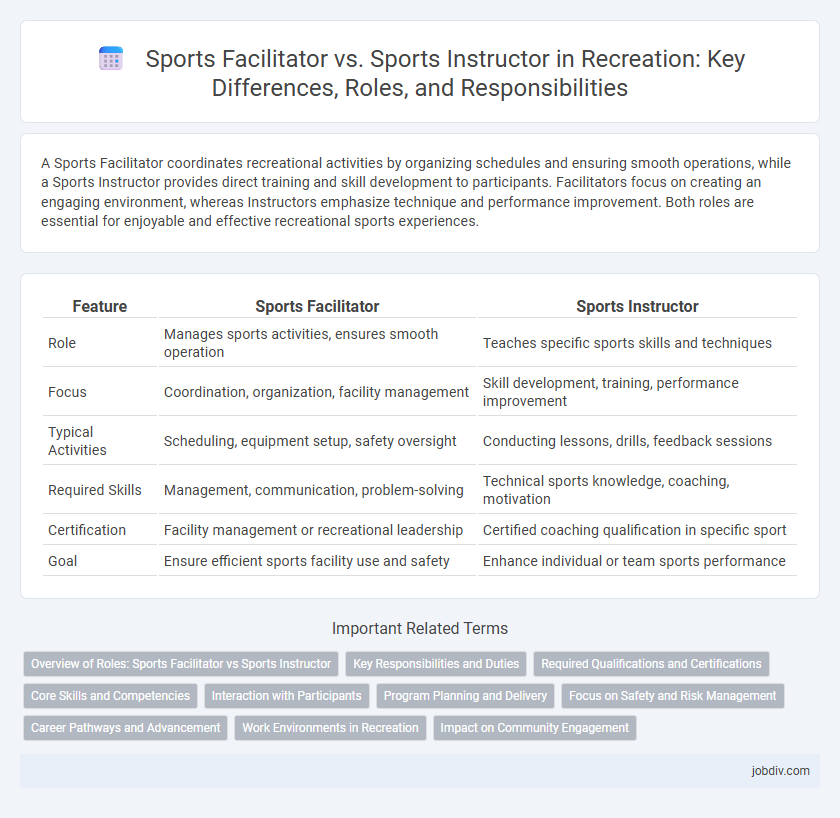A Sports Facilitator coordinates recreational activities by organizing schedules and ensuring smooth operations, while a Sports Instructor provides direct training and skill development to participants. Facilitators focus on creating an engaging environment, whereas Instructors emphasize technique and performance improvement. Both roles are essential for enjoyable and effective recreational sports experiences.
Table of Comparison
| Feature | Sports Facilitator | Sports Instructor |
|---|---|---|
| Role | Manages sports activities, ensures smooth operation | Teaches specific sports skills and techniques |
| Focus | Coordination, organization, facility management | Skill development, training, performance improvement |
| Typical Activities | Scheduling, equipment setup, safety oversight | Conducting lessons, drills, feedback sessions |
| Required Skills | Management, communication, problem-solving | Technical sports knowledge, coaching, motivation |
| Certification | Facility management or recreational leadership | Certified coaching qualification in specific sport |
| Goal | Ensure efficient sports facility use and safety | Enhance individual or team sports performance |
Overview of Roles: Sports Facilitator vs Sports Instructor
A Sports Facilitator focuses on organizing, coordinating, and managing sports programs and events, ensuring logistical efficiency and participant engagement. A Sports Instructor specializes in teaching specific skills, techniques, and training methods to athletes, enhancing their physical performance and mastery of the sport. Both roles are critical in sports recreation but differ in responsibility scope, with facilitators emphasizing program management and instructors emphasizing skill development.
Key Responsibilities and Duties
Sports Facilitators design and coordinate recreational sports programs, managing logistics, scheduling, and participant engagement to ensure smooth operation and community involvement. Sports Instructors deliver hands-on training, focusing on skill development, technique correction, and motivating athletes through direct coaching and personalized feedback. Both roles require strong communication skills but differ in their emphasis on program management versus on-field instruction.
Required Qualifications and Certifications
Sports Facilitators typically require a bachelor's degree in sports management, physical education, or a related field, along with certifications in first aid and CPR. Sports Instructors often need specialized certifications depending on the sport, such as coaching licenses from recognized sports organizations and sport-specific training certifications. Both roles benefit from additional qualifications like fitness training certifications and experience in athlete development or sports program management.
Core Skills and Competencies
Sports facilitators excel in organizational and communication skills, coordinating programs and managing participant engagement to ensure smooth event execution. Sports instructors demonstrate specialized coaching abilities, including technique refinement, performance analysis, and personalized training plans to improve athletes' skills. Both roles require leadership, adaptability, and knowledge of safety protocols, but facilitators prioritize program management while instructors focus on skill development.
Interaction with Participants
Sports facilitators emphasize creating inclusive environments by encouraging participant engagement and fostering teamwork, while sports instructors focus on teaching specific skills and techniques directly to individuals or groups. Facilitators often adapt activities to suit diverse participant needs, promoting social interaction and enjoyment, whereas instructors provide structured guidance aimed at skill development and performance improvement. The interaction style of facilitators is more collaborative and supportive, contrasting with the more directive and authoritative approach of instructors.
Program Planning and Delivery
Sports facilitators excel in program planning by designing inclusive schedules that cater to diverse participant skill levels, promoting ongoing engagement and community involvement. Sports instructors focus on delivery by providing expert coaching and technical skill development tailored to individual or team performance goals. Effective recreation management combines both roles to ensure well-structured programs and high-quality instructional sessions drive participant success and satisfaction.
Focus on Safety and Risk Management
Sports facilitators implement comprehensive safety protocols and conduct thorough risk assessments to create a secure environment for all participants. They coordinate emergency response plans and ensure compliance with industry regulations to minimize potential hazards. Sports instructors emphasize proper technique and equipment use, actively monitoring athlete behavior to prevent injuries during training sessions.
Career Pathways and Advancement
Sports facilitators coordinate community programs and manage sports events, leading to roles in program development or sports management. Sports instructors specialize in skill training and coaching, often advancing to positions such as head coach or athletic trainer. Both career paths offer opportunities for certification and leadership roles within sports organizations.
Work Environments in Recreation
Sports facilitators often work in community centers, recreational parks, and youth clubs, focusing on organizing activities and ensuring inclusive participation. Sports instructors typically operate within gymnasiums, sports academies, and specialized training facilities, providing technical skill development and performance coaching. These distinct work environments highlight the facilitator's role in engagement and accessibility, contrasting with the instructor's emphasis on skill refinement and athlete progression.
Impact on Community Engagement
A Sports Facilitator drives community engagement by organizing inclusive events and creating accessible programs that encourage widespread participation in physical activities. A Sports Instructor focuses on developing individual skills and performance through specialized training, often impacting smaller groups or teams. Both roles enhance community health and social cohesion, but facilitators have a broader effect on collective involvement and recreational inclusion.
Sports Facilitator vs Sports Instructor Infographic

 jobdiv.com
jobdiv.com